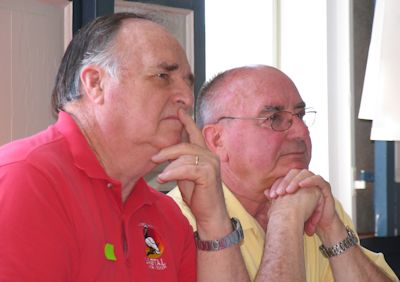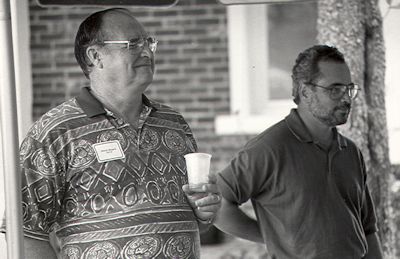SNEADS FERRY — Ask Sneads Ferry resident and former N.C. Coastal Federation president Melvin Shepard Jr. to talk about himself publicly and he’ll probably clam up.
“I’m very busy and I’m 80 years old, and when I get home, all I really want to do is put my feet up,” he said one recent afternoon when he took a phone call at his business, New River Nets in Sneads Ferry. That’s undoubtedly accurate: Most 80-year-olds aren’t running businesses.
Supporter Spotlight
“I do not talk about myself well,” he said later, in a slightly more explanatory mood. “I ran for (Onslow) county commissioner in the past and I suddenly realized then that I was not comfortable saying that I was better than any of the other candidates.”
But Shepard, a Wilmington native is – whether he’ll admit it or not – better than many, if not most, at least in terms of what he’s done for the coastal region of North Carolina. The proof will come today, when he’ll join the relatively short list of people who have won the Eure-Gardner Award from the N.C. Coastal Resources Commission, the policy-making board established by the N.C. Coastal Area Management Act.
The award, the highest honor the CRC can bestow, is given to a person or group for significant contributions to protecting the natural, cultural and economic resources of the coastal area. It is named for Thomas Eure, the first chairman of the CRC, and William Gardner, a long-time member and former chairman of the Coastal Resources Advisory Council.
 Melvin Shepard, left, and Dick Bierly listen intently during a retreat of the N.C. Coastal Federation Board of Directors. |
 Melvin Shepard, left, and Todd Miller, the founder of the N.C. Coastal Federation, in 1987. |
Shepard, 80, co-owner and operator of New River Nets and a member of the panel from 2000 until 2013, will accept the honor at 5:30 p.m. today during the first day of the panel’s two-day meeting at the DoubleTree Inn in Atlantic Beach. He probably won’t say much then, either.
But Bob Emory, who chaired the CRC during some of Shepard’s time on the board and who is still a member, was willing to say what Shepard won’t.
Supporter Spotlight
“Even though Melvin was a member of the CRC for a long time, the Eure-Gardner award is not about longevity,” said Emory, who will present the award to Shepard. “It’s about the quality of the service. And Melvin certainly meets that standard.
“He was a terrific and respected member of the commission,” added Emory, “and it’s very appropriate that he receive this honor. Melvin represented commercial fishermen on the board, and he always did a great job presenting their perspective and representing their interests.”
It was, Emory said, a very important perspective to bring to the board, and it was important that the fishermen be strongly and passionately represented. It is, after all, the COASTAL resources commission, and who depends upon coastal resources more than those who make a living harvesting and selling seafood.
“One discussion in particular stands out in my memory,” Emory said. “We were talking about a variance for a project, and someone noted that all of the waters around the project were closed to shellfishing.”
The obvious implication, Emory said, was that if the waters were already closed because of bacterial pollution from stormwater runoff, what difference would a variance from the rules make? After all, it was as bad as it could get.
“Melvin reminded us then, as he always did, that every closed shellfish area is potentially an open shellfish harvest area,” Emory said. “That’s a very important perspective, and one that was always helpful to us.”
Shepard, Emory added, almost always presented a calm demeanor, but those who served with him never mistook his calm for apathy.
“He was passionate about those he represented and about their interests,” he said. “If he saw something he thought was wrong – and he was always knowledgeable and prepared – he made his opinion known, and in an effective manner.”
While uncomfortable talking about himself, Shepard was more comfortable talking about his motivation. He said he loves the coast and its people, especially those from whom he and his wife, Tillie, are descended. His roots go way back.
“In my lifetime, I have observed firsthand the damage to our natural resources by people only interested in the almighty dollar,” he said. “I consider North Carolina and Onslow County as ‘mine.’
“My and Tillie’s ancestors utilized coastal North Carolina for centuries. The Guthrie, Grants, Jenkins, Edens, Shepards, Ottoways, Whleys, Kings, Browns and on and on… I believe, ‘Expect someone to do their best to leave a coast that is usable in the best sense of the word.’ Why not do my best?”
Mike Lopizanski, a longtime staffer at the Division of Coastal Management headquarters in Morehead City and currently the policy and planning section chief, worked with Shepard a lot over the years and also hailed his service.
“Melvin had a very strong and thorough understanding of our coastal management program and its importance to the people (of the 20 coastal counties) affected by it,” he said. “From a staff perspective, he was very easy to work with and he worked hard to help us achieve the goals we shared.”
Like Emory, Lopizanski stressed Shepard’s intense dedication to the coast and his determination to represent the hard-working and independent commercial fishermen who depend upon clean and healthy waters.
“He did a great job bringing their perspective to us and in his comments during the meeting,” he said. “You could count on him to make his points clearly.”
In particular, Lopizanski said, he recalls Shepard as being “very much an advocate for coastal habitat plans, which the CRC, the Environmental Management Commission and the Marine Fisheries Commission had to adopt. He realized the importance when many didn’t.”
In addition, Lopizanski said, Shepard was an unstinting supporter of effective and meaningful land-use planning by the coastal counties. The plans are required of all local governments in the coastal region and are intended to serve as blueprints for where development should and should not occur, and what types should be allowed in areas where it is allowed.
While commercial fishing is specifically regulated by a separate panel and state agency, the Marine Fisheries Commission and the N.C. Division of Marine Fisheries, Shepard knew that the CRC and the coastal management division that enforced its rules had a tremendous bearing on what the watermen would be able to harvest under the fisheries rules.
He was also deeply involved in fisheries management. He was appointed to the state committee that developed the Fisheries Reform Act in 1996. Passed by the N.C. General Assembly, the bill overhauled saltwater commercial and recreation fishing. While serving on the committee, Shepard proposed and then promoted the development of Coastal Habitat Protection Plans, which became a hallmark element of the reform law. These plans are now recognized as one of the most innovative habitat protection measures in the nation.
All of those roles, of course, dovetailed with his active membership in the N.C. Coastal Federation, which he served as president for 20 years, more than half of its existence. Though he still remains on the board of directors, Shepard stepped down as president last year.
“The Coastal Federation has been a place where I can help others who are really dedicated to preservation of the natural resources of the state,” he said.
In 2009, he won the organization’s lifetime achievement award.
“He had led us through tremendous growth and our evolution as a respected and effective organization,” founder Todd Miller noted at the time. “He is as comfortable building nets as he is walking the halls of the legislature and influencing lawmakers. His close community ties and love of the coast drive his dedication to working on behalf of what is best for our coast and its people.”







